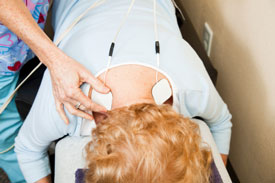Author: Tyler J. Tonso, DC CKTP FMSC
 You hear it all the time. Somebody bends over either randomly or to pick something up and POP! Their back goes out. But what does that mean? People have become so used to the phrase that they either don’t think about what they’re saying, or for some reason think their spine has something that randomly moved out of place. Do people really think a vertebra dislocated out of place? I can assure you this is not the case and the cause for pain is actually much simpler than you think.
You hear it all the time. Somebody bends over either randomly or to pick something up and POP! Their back goes out. But what does that mean? People have become so used to the phrase that they either don’t think about what they’re saying, or for some reason think their spine has something that randomly moved out of place. Do people really think a vertebra dislocated out of place? I can assure you this is not the case and the cause for pain is actually much simpler than you think.
It’s Not Going Anywhere – It’s Injured
I always ask people when they tell me their back goes out, “Where did it go?” The fact is your back doesn’t “go out” anywhere. While there are a multitude of things it could possibly be, it tends to be either a simple sprain/strain of the low back or an injury to the lumbar disc. The back “going out” is usually preceded by heavy or repetitive lifting which has stretched the low back tissues making it vulnerable to injuries. At that point it takes something as simple as bending over to pick up a pencil on the ground to tear either the annular fibers of the disc or ligaments and tendons of the low back. This article on achy low back pain explains more about repetitive stretching, the pain it causes, and the repercussions.
When the injury happens, people usually report they can’t bend over, stand up, twist, or pretty much move at all. This makes sense since the low back is a core stabilizer and if something tears in that area our body is going to have trouble doing any motion that involves core movements. This is usually soon followed by muscle spasms. People often associate muscle spasms as being bad, but in this case the spasm is helping protect the injured area from moving excessively which may just cause further injury and pain.
Why Staying Active Can Help You Get Better

Electrical stimulation can help decrease muscle spasms and pain
So what should you do when your back “goes out?” Research has changed how people treat injuries like this and it is actually better to stay active than simple bed rest. However, it’s important to not aggravate the injury and there tends to be a fine line between staying active and not reinjuring the area.
Any time there’s an injury the body lays down collagen during the healing phase which results in scar tissue. Chiropractic adjustments can help decrease the formation of scar tissue as the area begins to heal by gapping the surrounding joints and stretching the surrounding tissues that have been injured. This can also help increase range of motion and decrease local muscle spasms. Other modalities including soft tissue therapy, therapeutic ultrasound, kinesio taping, and electrical stimulation can help decrease inflammation, pain, and help the tissues heal properly. Core stabilizing exercises should be emphasized and are usually ignored as people start to feel better. These exercises help the collagen being formed to align properly and strengthen the surrounding structures. This helps decrease the chances of reinjuring the area.
Proper Spine Care
Hopefully you understand now that backs don’t “go out” anywhere and nothing needs to be put back in to place. However, it’s important to properly take care of your back when you injure it and just because you start to feel better doesn’t mean you can ignore it and expect it to never happen again.
Chiropractic care is an important factor in maintaining a healthy spine. Contact us today to schedule your no-obligation consultation.

Oct 01, 2016 at 2:08 AM
Everything you described happened to me. It was scary not knowing what really happened and even more confusing when X-rays didn't show anything. Thank you for the article, I only wish this was all explained when it happened.
Jun 08, 2017 at 5:32 PM
The only thing I find that questions you description is the fact that when your back goes out it usually only takes a few days to come back home. If something were torn such as a disc ligament or tendon I would expect the recovery to take weeks.
Jun 08, 2017 at 10:57 AM
Hi Jon, Thanks for the input. As with any sprain/strain injury, there are different levels of tears. For instance when you workout and are sore the next day, this is partially due to microtears in your muscles. Are people sore for weeks because of this? Not likely. It's a couple days of soreness and then they are healed. Any tissue can be "torn" to a different severity. And yes, several people do injure it enough when their back "goes out" and it takes much longer than a couple days. Again, this often depends on the severity of the tears associated with the injury. A person can't simply think of a large tear in order to make sense of the problem, otherwise it would be much more serious. There are many other reasons why the pain can be so severe with a sprain/strain, "tear", in the low back; many nociceptors in the surrounding area, muscles spasm in order to protect the back which creates more pain, etc.
Jul 06, 2017 at 5:16 AM
As insane as this might sound, my lower back ''goes out'' when I get a cold and only when I get a cold . It started when I was 30 and now 42 nothing has changed . Thankfully I get a cold maybe once every year and a half but my lower back is then in serious pain and I take plenty of motrin for 2 days .
Sep 14, 2018 at 2:05 PM
I previously had back pain when I was in my 20's which was muscular in nature. This caused pain with prolonged sitting and walking. With exercise and particular yoga stretching and relaxation it almost fully resolved. However, before I starting doing yoga, this was a major problem in my life for about 5 years. This is what I understand to be called mechanical low back pain. Quite different from this is when my back "goes out". This is a sudden onset severe pain that happens about once every year or 2. When my back "goes out", I can't stand up straight, bending over is difficult, getting up is difficult, etc. This usually lasts few a few days then resolves completely.
Follow Us!
Facebook Social LinkYelp Social LinkRecent Newsletters